

Tao Te Ching
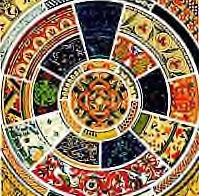
Renaissance Lineage
The word Renaissance is a blending of the Italian rinascimento, "rebirth" and the word "humanist.” It began in Italy, spread across Europe, continued from the 14th through the 16th century, and inspired the modern humanism of today. It refocused the cultural attention from religion to philosophy, from only the Bible to the almost-lost riches of ancient Greek and Roman thought. It turned people’s eyes from heaven to the world of experience, humanity, science, and nature. It inspired an educational system devoted to philosophy, history, rhetoric, grammar, and poetry; the engagement of common people in their communities and civic life; the creation of a better civilization based on more equality, wisdom, and freedom of thought. Called a pagan revolt funded by oligarchies and economic exploitation, lost in the spirit of freedom without restraint, misled by an intense captivation with the past that smothered youthful creativity, and built on pretense and insincerity; the Renaissance to some extent deserves this criticism while maintaining its dramatic and positive influence on cultural evolution and the modern world. Tired of the “basic badness” philosophy leaking from the notion of original sin, the Renaissance affirmed life and the human experience; the sacredness of the world and humanity; moral freedom, peace, wisdom and compassion. It inspired a cultural liberation that spread throughout the world and became a major influence on the best cultural elements we take for granted today.
People (23)

Meister Eckhart (Eckhart von Hochheim)
1260 – 1328 CE
Philosopher, theologian, and mystic; Meister Eckhart represents a cultural and philosophical pivot at the end of the Middle Ages. In his own words but like Lao Tzu and the Buddha, he taught that Enlightenment is hidden inside our hearts and through emptiness, compassion and egolessness we become one. Though brought before the Inquisition and tried for heresy, his influence since includes from Schopenhauer (who said, “Buddha, Eckhardt, and I all teach essentially the same.”), to the Theosophical Society, to the politics of the UN’s Dag Hammarskjöld, to the psychology of Erich Fromm, to artists like Van Gough and Dürer, to authors like J. D. Salinger, and in modern times to theologians like Matthew Fox and Eckhart Tolle.
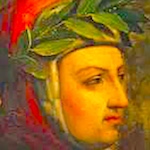
Petrarch
1304 – 1374 CE
The “Father of Humanism,” troubadour of romantic love, lover of nature, “Virgil born again,” the most famous unrequited lover, and most important poet of his age; Petrarch inspired an interest in ancient history and as “the first tourist” discovered and translated many old manuscripts including Cicero’s letters that sparked the 14th-century Renaissance. Holding the sense over the words, he challenged orthodoxy and invented new Latin terms to describe Greek philosophy, developed the concept of an historical “Dark Age” after the fall of Rome, a need for a cultural revival, inspired the political, military, and religious leaders of his time to ground their lives in classical values and contemplation. and his sonnets became a model for lyrical poetry through modern times.
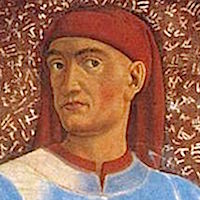
Giovanni Boccaccio dʒoˈvanni bokˈkattʃo
1313 – 1375 CE
Close student, friend and collaborator with the “Father of the Renaissance,” Petrarch; Boccaccio became a popular poet/writer, “the first Greek humanist in Western Europe,” and promoted the ancient literature, philosophy, and history which set the stage for the Renaissance. His book on classical mythology became a key reference for 400+ years and challenged Christian belief that only the Bible was relevant, that there was only harm in “pagan” writings. In an early nod to feminist proposition, he wrote the first collection devoted to the biographies of famous women. Living through a tumultuous time of political intrigue, the executions of his friends, bitter poverty and bad health; he resisted many of the era’s superstitious and setting-sun forces; translated works by Homer, Euripides, and Aristotle; and helped launch one of history’s most influential shifts, the Renaissance.
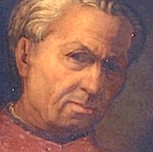
Poggio Bracciolini
1380 – 1459 CE
Gladiatorial orator, personal secretary to 7 popes including the “Antipope” John XXIII, scholar, early humanist, prolific and for his time astonishing writer; Poggio helped develop the Italic font, invented the Roman font still popular today, and helped spark a rebirth of old wisdom that led Europe out of the Dark Ages, into science and our modern age. Profuse traveller, friend to the great scholars of his time as well as politicians like Pope Nicolas V, Cosimo and Lorenzo de' Medici who supported his efforts to find and preserve ancient Greek and Roman manuscripts; he discovered and copied a large number of important classical works forgotten and decaying in old libraries including De Rerum Natura, Lucretius’ only surviving book.
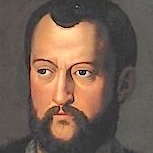
Cosimo de’ Medici
1389 – 1464 CE
Inheritor of a huge fortune; wandering bibliophile; owner of banks, businesses, farms, and factories; friend to cardinals and sultans alike; founder and “first among equals” leader of a political dynasty that helped begin and extend the Renaissance; Cosimo de’ Medici did what the rich need to do today: use their wealth to benefit the world instead of only themselves. In his own and other countries he strongly supported public works, charities, and libraries; funded the work of poets, artists, scholars and philosophers; established an academy for the study of Plato and launched the Renaissance revolution of philosophy over the Middle Ages’ scholasticism - the sense over the words.
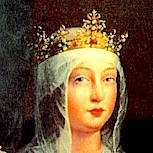
Isabella I (of Castile)
1445 – 1504 CE
Wise Renaissance queen, patron of the arts, strong centralizing leader, Christopher Columbus’ financier known for her fairness and justice, and the first woman depicted on both a US coin and US postal stamp; Isabella - after helping to reunify Spain, reorganized the government, dramatically brought down the debt and the crime rate to the lowest it had been in many years, and established Spain as the first global power dominating Europe for more than 100 years. Although she persecuted Jews and Muslims, her life was scrutinized by the Catholic Church for 500 years before being sainted in 1974 with the title, "Servant of God.”
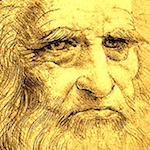
Leonardo da Vinci
1452 – 1519 CE
One of the most talented people to have ever lived, original “Renaissance Man,” father of paleontology, ichnology, and architecture; with a passionate curiosity and interest in everything, da Vinci’s genius extended to science, music, mathematics, engineering, painting, architecture, sculpture, anatomy, geology, astronomy, botany, history, and cartography. Remarkable inventor, mystical pantheist, vegetarian, savior of caged birds, and exemplar of journey-without-goal, he wrote over 5000 pages but didn’t finish one book, many of his commissions, even some of his greatest paintings, and claimed that one of the his most famous paintings, The Mona Lisa was incomplete.

Erasmus (Desiderius Roterodamus)
1466 – 1536 CE
"Greatest scholar of the northern Renaissance"
"Prince of the Humanists,” famous translator, globalist and true citizen of the world; Erasmus emphasized a middle way approach between Luther and the Pope during the Reformation angering both sides. Not many know much about about him but his legacy is well known in the sayings and phrases he compiled and popularized. Some of his sayings like “The grass is always greener on the other side of the fence,” “God helps those who help themselves,” “Don’t put the cart before the horse,” “Leave no stone unturned,” “In the land of the blind the one-eyed man is king,” “No sooner said then done,” “Between a rock and a hard place,” “Call a spade a spade,” “Women – can’t live with them or without them,” “Like father like son,” “To look a gift horse in the mouth,” “To break the ice,” “To cut to the quick,” “One step at a time,” “A necessary evil,” “What’s done cannot be undone,” “Up to his eyeballs,” “To sleep on it,” have not only entered into common conversation; but also, become a powerful influence on Western culture.
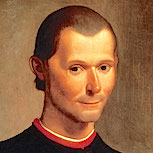
Machiavelli (Niccolò Machiavelli)
1469 – 1527 CE
Unjustly vilified by history as well as his contemporaries, Machiavelli is known as the “founder of modern political science,” a major influence on the USA’s founding fathers, and the development of modern science. Personified with unscrupulous, immoral political activity, devious deceit, realpolitik and evil tyrants; many of history’s true heroes like Spinoza, Rousseau, Francis Bacon, John Milton, Montaigne, and Descartes secretly considered him an inspiration for the Enlightenment that followed 200 years later. Rousseau thought his book The Prince - far from condoning - was not written as advice to ruler who already understood these principles but rather satirically exposed their corrupt methods to the common people. Not the source for the quote, “The end justifies the means,” Benjamin Franklin and Thomas Jefferson considered him a “partisan of liberty” and John Adams seriously studied his philosophy and used it to clarify the Constitution’s idea of mixed government.

Michelangelo
1475 – 1564 CE
One of the greatest artists of all time and complete “Renaissance man,” much of Michelangelo’s painting, sculpture, and architecture stands with the world’s most famous. Also a poet and engineer and unlike many famous artists, his genius was recognized during his lifetime – he was the first Western artist with a biography published while still alive. His statues of David and the Pietà are the most famous sculptures in the west, his painting of the Sistine Chapel ceiling is the “cornerstone of Renaissance art,” his architectural innovations were revolutionary and St. Peter’s Basilica is regarded as the greatest building of its age and remains one of the two largest churches in the world.
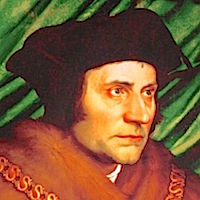
Thomas More
1478 – 1535 CE
Thomas Moore (1478 – 1535)
Christian humanist, Henry VIII confidant, ascetic, Lord High Chancellor of England, brave psychological explorer; Moore both embraced and went beyond his time and culture. On one hand opposing Martin Luther and the Protestant Reformation, he also protested against Henry VIII’s appropriation of the title, Supreme Head of the Church of England and was beheaded for his efforts. Living at a time of deep cultural transition when idle noblemen raised rents, created land enclosures, caused extreme poverty, starvation, and 72,000 English thieves were hanged; he helped revive a radical interest in Lucretius and Epicureanism. His book Utopia envisioned a society based on the pursuit of collective happiness and included universal health care, public housing, child care centers and a 6-hour work day rather than the prevalent materialism, nepotistic, personal advantage and power. G. K. Chesterton, Jonathan Swift, and many others considered him the greatest Englishman.
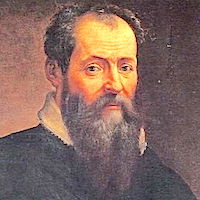
Giorgio Vasari dʒordʒo vaˈzaːri
1511 – 1574 CE
The first art historian, friend and student of Michelangelo, first to use in print the term "Renaissance,” architect, politician and painter; Vasari praised competition and was one of the first writers to use this term related to economics. The first to write a series of biographies about famous artists and describe the continuity of art, his dedication to artists and their art was so great that he once ran into the peril of a rioting crowd to rescue the pieces from an arm of Michelangelo’s statue “David” they had broken with a bench. Unlike many artists unrecognized until after their death, he was famous during his lifetime, became very wealthy, and even a powerful politician.

Teresa of Avila
1515 – 1582 CE
In a time caught up in the fury and violence of religious intolerance, inquisitions and sectarian war: Teresa symbolized a child-like devotion and surrendering to a forgiving and compassionate god. Saint, reformer, founder of 40 Carmelite monasteries, author and theologian; with deep insight she championed and helped establish a tradition for western mysticism and was the first in the West to harmonize a scientific view with contemplation and a mystical understanding. An inspiration for the Spanish Renaissance and Christian meditation practice, she promoted “mental prayer” and a personal approach to spirituality.
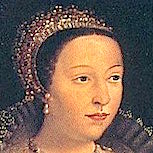
Catherine di Medici
1519 – 1589 CE
Queen of France, niece of Pope Leo X, mother of 3 kings and 2 queens (after resorting to using cow dung and drinking mule's urine), and one of the most influential people of her time; Catherine di Medici’s famous parents died from syphilis shortly after her birth and she was immediately caught up in political intrigues which at one point forced her into a convent for 3 of her happiest years. For 30 years she sponsored musicians, painters, sculptors, architects, Montaigne, and every branch of art. Continually working for peace in a time of many wars, she tried to reconcile Catholic-Protestant factions but underestimating the power of belief over reason, but this only generated wars that brought to the surface her great political and strategic skills but also earned her acclaim as a Machiavellian witch.

Gaspara Stampa
1523 – 1554 CE
Unrecognized during her life with only 4 of her more than 300 sonnets and poems published, Gaspara is now considered one of the best 16th century lyricists and greatest Italian woman poet of any time. From a merchant class and not nobility like the other poets of her time, she didn’t let her humble origin and lack of credentials stop her from writing some of the most memorable works of her era. Also a wonderful singer and lute player, she transformed the pain of unrequited love into inspired artistic creation that became a milestone in women's literature and a huge inspiration for Rainer Maria Rilke and many others.
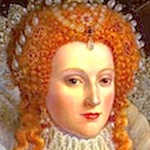
Elizabeth I (Gloriana, The Virgin Queen)
1533 – 1603 CE
Though far from a sage or saint, Elizabeth began her reign with England reviled and powerless but left it 45 years later rich and strong. Called by historians “The greatest ruler England has ever had,” she was patron to Shakespeare, Bacon, Marlowe, and Drake launching the scientific revolution and a golden age of progress and learning. Excommunicated by Pope Pius V, she believed that faith was personal, became “mother of the Church of England.” She opened up trade with the Islamic Ottoman Empire, and helped end the Vatican’s power over all Europe. Though stained by abuses in Ireland, she listened to popular sentiment and advice dedicating her life to her country and people becoming a symbol for good government and resistance to foreign threat.
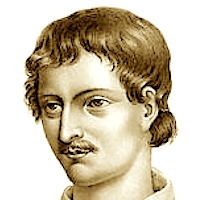
Giordano Bruno
1548 – 1600 CE
Giordano Bruno (1548 – 1600)
Like Galileo, a "martyr of science," Dominican friar, Epicurean poet, cosmological mathematician; Bruno fled his monastery and wandered through France and Italy teaching. Burned at the stake by the Roman Inquisition for his scientific, pantheistic, and Epicurean views; Bruno first described stars as distant suns with planets of their own, championed the Copernican view that the earth is not the center of the universe, and taught the dangerous view that likewise people and our civilizations are not the center of the cosmos but only a tiny part of something much larger. This led to an 8-year trial, his torture and death but also a strong foundation for the newly emerging sciences and the openness to free thought.

Francis Bacon
1561 – 1626 CE
“Father of the scientific method,” Lord Chancellor of England, orator, jurist, and philosopher; Francis Bacon represents a huge step in the evolution of consciousness but not before indulging in a sybaritic lifestyle, being charged with 23 cases of corruption, being banned from Parliament and imprisoned in the Tower of London. In his ex-con life, he undermined the strength of religion, railed against tradition and authority, became “the most powerful and influential intellect of his time,” warned of the rich getting too rich as a cause of social disease and revolt, the likelihood of new inventions causing more harm than help, and championed the rise of reason and science that brought about our modern world.
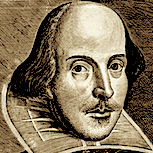
William Shakespeare
1564 – 1616 CE
The greatest writer in the English language whose works - 400 years after his death - have been translated into every living language and remain popular, respected, studied, and performed throughout the world; Shakespeare was as Ben Johnson wrote, "not of an age, but for all time.” When 18 years old, he had his first child 6 months after getting married and before long became a playwright and actor in his own and others’ plays. Unlike many of the prime movers on our biography lists, Shakespeare, though not revered, was successful during his lifetime (as a businessman) and by the time he was 33 while living in London owned the second largest home in Stratford. His influence not only revolutionized drama, scholars link more than 20,000 pieces of music to his writings, many famous paintings, his language helped shape modern English and common everyday phrases, Sigmund Freud drew heavily on him while developing his psychology theories, and Durant describes his influence as moving us to the depths of our spirit.
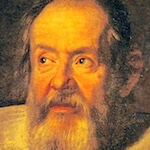
Galileo
1564 – 1642 CE
Arrested by the Inquisition for the last 9 years of his life but called by Einstein “the father of modern science;” books banned by the Catholic Church but called by Stephen Hawking responsible for the birth of modern science; condemned and persecuted by conservative contemporaries but called by Grotius “the greatest mind of all time;” Galileo – though living in a time when “heretics” were burned at the stake – raised the status of science, with his telescope designs demonstrated the universe’s immensity, and helped science separate from both philosophy and religion.
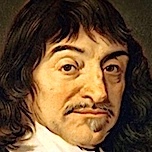
René Descartes
1596 – 1650 CE
Though remaining a Catholic, solidifying the dualistic view in Western thought as well as “Cogito ergo sum” belief in a separate self; Descartes emphasized methodic doubt and the impossibility of externally based intellectual certainty undermining faith in belief and Church doctrine. This sparked a thought revolution that created the modern era. He developed analytic geometry (using x, y, and z for unknowns) and using superscripts for powers or exponents, discovered the law of reflection, and the basis for the development of calculus. Known as the “father of modern philosophy,” he changed the course of Western philosophy and his influence continues to this day.

Balthasar Gracian
1601 – 1658 CE
Spanish Jesuit, philosopher and prolific writer, Gracian amplified the slogan/quote tradition of Aesop, Yang Xiung, the Dhammapada, Atisa and continued by Erasmus and Ben Franklin. At times highly respected, he was also exiled by outraged superiors for his provocative philosophy and lost his teaching tenure. An important influence on Nietzsche, Voltaire, Schopenhauer and Winston Churchill; his book Art of Worldly Wisdom - translated into many languages – continues today as a best seller and exceptionally valuable resource of helpful advice.

Baruch Spinoza
1632 – 1677 CE
One of the most important, radical, and influential philosophers in the modern era, Spinoza established a strong foundation for democratic political thought, the 18th-century Enlightenment, and a view beyond sectarian religion. Known as ”the prince of philosophers” and one of our greatest thinkers, Spinoza was born Jewish but was excommunicated at an early age. Criticized and ridiculed during his life, he was an important inspiration for Karl Marx, Nietzsche, Goethe, Santayana, Borges, and the deep ecology movement. Albert Einstein said Spinoza was the biggest influence on his world view and Will Durant called him his "favorite philosopher."
Comments (1)